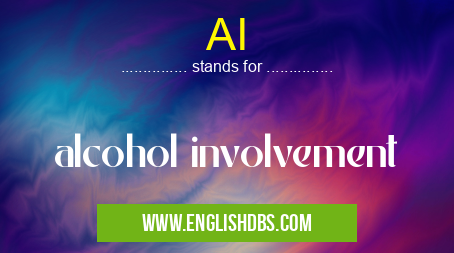What does AI mean in BRITISH MEDICINE
Alcohol Involvement, or AI as an acronym, is a term used to describe the ways in which alcohol can affect individuals and potential outcomes. This includes aspects of alcohol use such as drinking patterns, consequences of drinking, and the effect alcohol may have on relationships. It is important to understand what AI encompasses in order to fully comprehend its implications both personally and socially.

AI meaning in British Medicine in Medical
AI mostly used in an acronym British Medicine in Category Medical that means alcohol involvement
Shorthand: AI,
Full Form: alcohol involvement
For more information of "alcohol involvement", see the section below.
Alcohol Use
AI includes any amount of alcohol that is consumed, whether it be ‘safe' amounts or abuse. It covers social drinking as well as problem drinking, which can range from mild abuse to severe alcohol dependency. For example, someone who frequently attends parties where they are having a few drinks can still be considered at risk for experiencing consequences related to their drinking behavior even if they don't consider themselves an alcoholic.
Consequences of Alcohol Use
The consequences of alcohol use can range from minor issues such as feeling hungover the next day to more serious long-term effects like liver failure or addiction. Additionally, individuals affected by AI may experience negative emotional and psychological impacts such as anxiety and depression. Depending on the severity of their alcohol usage and other factors present in their lives, AI can create adverse outcomes that could potentially be life-altering.
Relationships Impacted by AI
In addition to personal distress caused by AI, relationships with family members and friends may also suffer due to the effects of excessive drinking or problem behavior associated with heavy use of alcohol. Drinking decisions made by an individual with AI will often have direct ramifications for those around them, ranging from feelings of embarrassment to significant changes within the family dynamic due to strained communication or lack thereof altogether. Social acceptance may also be impaired when one uses alcohol excessively versus those who responsibly drink in moderation when appropriate.
Essential Questions and Answers on alcohol involvement in "MEDICAL»BRITMEDICAL"
What is alcohol involvement?
Alcohol involvement is when an individual has consumed, is consuming, or is likely to consume alcohol. This could be either for recreational, social, ritualistic or medicinal purposes.
What are the consequences of alcohol involvement?
Alcohol involvement can lead to potentially dangerous outcomes for individuals and communities alike. These can include physical health problems such as liver disease, mental health issues and increases in risk-taking behaviour.
Is it legal to drink alcohol in all countries?
The legality of drinking varies widely between countries. In some countries and regions it may be illegal to buy or consume alcohol under certain ages and circumstances, while in other places there may be tax regulation and other licensing requirements that must be met.
What effects does alcohol have on the body?
Long-term consumption of large amounts of alcohol can result in permanent damage to vital organs such as the brain, heart, kidneys and liver. Short-term effects may include impaired judgement, vomiting and a heightened risk of injury due to slurred speech, blurred vision and slower reaction time.
What are the risks associated with drinking too much?
Consuming too much alcohol can cause dehydration which can lead to impaired cognitive function and temporary memory loss. It can also increase the risk of developing serious medical conditions such as high blood pressure, stroke and heart disease. At higher levels it can cause coma or become fatal due to respiratory arrest or poisoning from toxic amounts of alcohol in the body.
How does drinking affect driving?
Drinking impairs a driver's motor skills making them less able to react quickly in emergencies or unexpected situations. Drinking also affects decision making which can make driving more dangerous as a driver cannot ensure their safety by avoiding risky decisions such as speeding or not wearing a seatbelt.
Can you get addicted to drinking alcohol?
Yes; Research suggests that approximately 15% of people who drink develop an addiction at some point in their life even if only temporarily[1]. Addiction occurs when someone's drinking becomes uncontrollable despite any potential negative consequences they may experience from continued use.
How do you know if you have an addiction?
If your drinking habits interfere with your daily life activities such as work or school, then this might indicate you are struggling with an addiction problem[2]. Other indicators could include cravings for drinks at specific times during the day; feeling unable to function normally without having had a drink; withdrawing socially; hiding your drinking habits from others; or struggling financially due to excessive spending related to alcohol.
Is there any way I can reduce my chances of developing an addiction problem due to alcoholism?
Yes; Reducing your chances of becoming dependent on alcohol involves staying within recommended limits[3]; regularly reviewing how much you are drinking; setting goals related to reducing your intake; being aware of triggers that lead towards increased consumption; and seeking help from friends/family/professional organisations if needed.
Final Words:
Alcohol Involvement should not be taken lightly; it is a topic that needs attention and understanding both personally and socially in order to avoid potential detriment that could arise from excessive levels of consumption or problem behaviors related to drinking. Knowing the warning signs associated with AI is key in recognizing potential issues before they become too detrimental so that appropriate steps can be taken accordingly.
AI also stands for: |
|
| All stands for AI |
